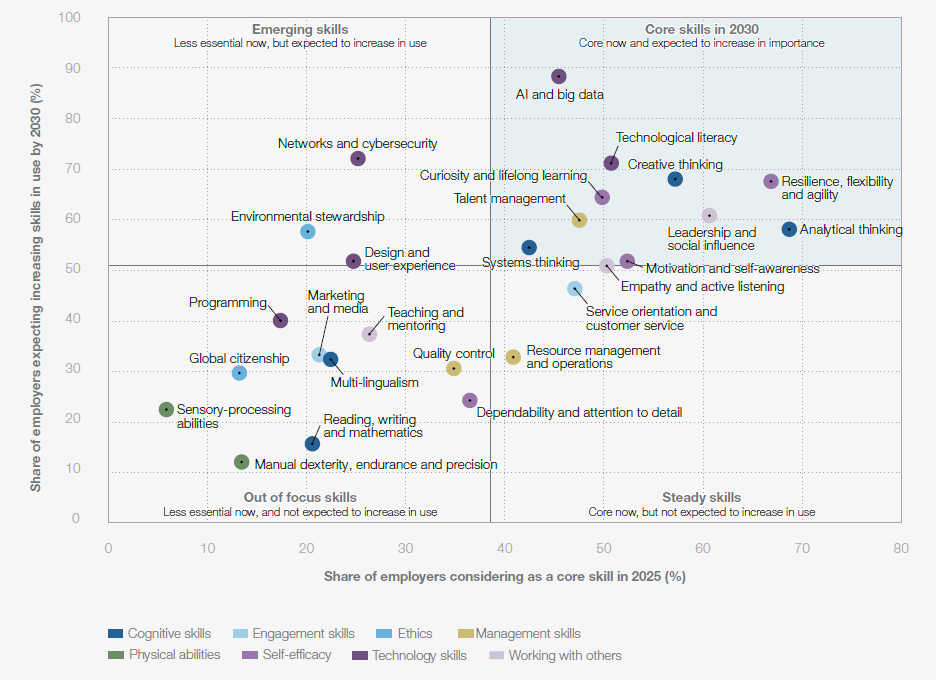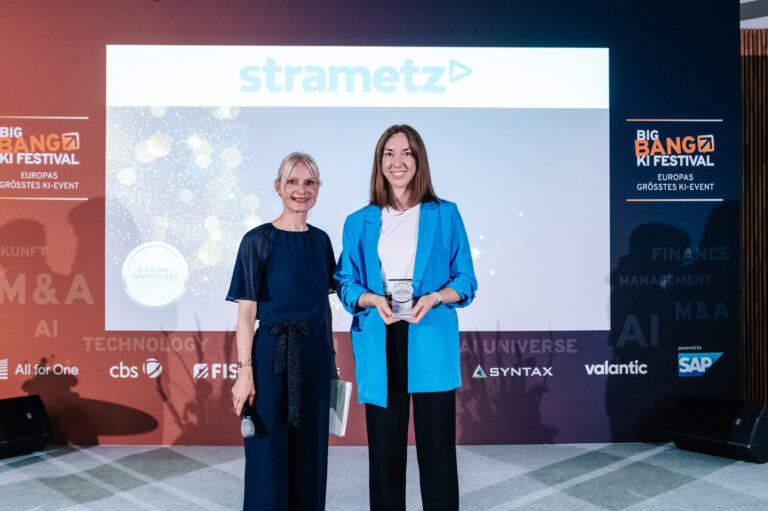Reading the World Economic Forum‘s latest Future of Jobs Report 2025, one key statement sticks in the mind:
The critical skills of the future are not technological – they are human.
While organizations talk about AI adoption, automation or new business models, the report shows something else:
The Future Skills 2030 are all about leadership, self-management, resilience, analytical thinking, empathy, etc. All of these skills determine whether people can lead effectively in a complex, constantly changing world of work. This is precisely where the challenge of modern HR development begins: these skills cannot simply be “taught”. You have to experience them , feel them, try them out and reflect on them.
Why human skills are becoming a competitive factor

Source: Future of Jobs Report (2025), p. 41.[/caption]
The graphic makes it quite clear: the future of work does not depend on how well employees master tools, but on how well they master leadership, communication and decision-making in uncertain situations. This includes skills such as:
- Leadership & Social Influence
- Motivation & Self-Awareness
- Resilience, Flexibility & Agility
- Empathy & Active Listening
- Analytical Thinking
These skills arise in moments when people have to take on responsibility – often under pressure and uncertainty. However, it is precisely these situations that are difficult to depict in traditional training courses. PowerPoints, role plays or seminars impart knowledge, but they do not generate behavior. And behavior is what matters.
For HR, this means that future viability is not created through content, but through hands-on training and real experience.
How leadership simulations make future skills visible and developable
Our leadership simulations start exactly where traditional development formats reach their limits. In a realistic, dynamic company scenario, participants experience first-hand how they lead – not how they think they lead. Managers are confronted with complex situations: growing resistance, contradictory expectations, team conflicts, time pressure, critical decisions.
They experience directly how their behavior affects people, results and the entire system. And this is precisely what makes future skills trainable.
Leadership & Social Influence: Leadership in action instead of theory in the seminar room
In the simulation, managers assume responsibility for a fictitious company. They steer teams through uncertainty, make decisions with consequences and directly experience how their behavior influences mood, motivation and performance.
This creates real leadership effectiveness – not as a theory, but as an experienced moment.
Motivation & self-awareness: leading yourself in pressure situations
Pressure, conflicts and complexity show unfiltered how someone reacts. What are my own stress patterns? How do I affect others? How do I make decisions when it really counts?
This self-awareness is one of the most lasting effects of our leadership simulations – and at the same time one of the most important future skills.
Resilience & agility: adaptability in real-life experience
In the simulation, framework conditions change suddenly: new stakeholders, unexpected problems, increasing resistance. Participants have to react, adapt decisions and change priorities. The result is not just “knowledge about agility”, but a deeply rooted experience of flexibility and resilience.
Empathy & active listening: creating trust when things get difficult
Leadership is shown in conversations – especially in challenging ones. The simulation reveals how well someone listens, integrates perspectives and involves team members. Empathy does not become an abstract idea, but a leadership skill in practice.
Analytical thinking: making decisions through the interplay of analysis and attitude
Analytical competence remains essential – but it only unfolds its effect in combination with leadership.
In the simulation, managers learn to classify data, assess risks and lead the team at the same time.
This combination of clarity and orientation is a key to the successful leadership of tomorrow.
Why simulations are becoming the new standard in leadership development
Simulations combine action learning, neurobiological learning principles, the critical incidents methodology and systematic behavioral observation.
In this way, they achieve something that traditional training courses are unable to do:
- They generate real emotions
- they create sustainable insights
- they make behavior visible
- and they make future skills specifically developable
For HR, personnel development and leadership development, this means that they receive a tool that can be used both diagnostically and in a development-oriented manner – and that strengthens future skills where they actually arise: in behavior.
Simulation Days 2026: Experience and develop leadership
To give HR managers and decision-makers an authentic insight, we regularly offer open simulation days.
Here you can experience how future skills become visible and trainable in real leadership situations.
📅 View dates and secure information now.
Conclusion: Future skills are not developed in front of a screen – but through real experience
The Future of Jobs Report makes it clear: the world of work is changing – and with it the demands on leadership. Future skills such as resilience, empathy, leadership and analytical thinking are becoming decisive success factors for companies. However, these skills can only be developed where behavior becomes visible: in realistic situations. This is exactly where we come in with our behavior-oriented simulations.
If you would like to prepare your managers effectively for the dynamic future in 2026, we will be happy to support you.











